2018高中英语每日一题(第3周)每周一测1
- 格式:doc
- 大小:190.50 KB
- 文档页数:9
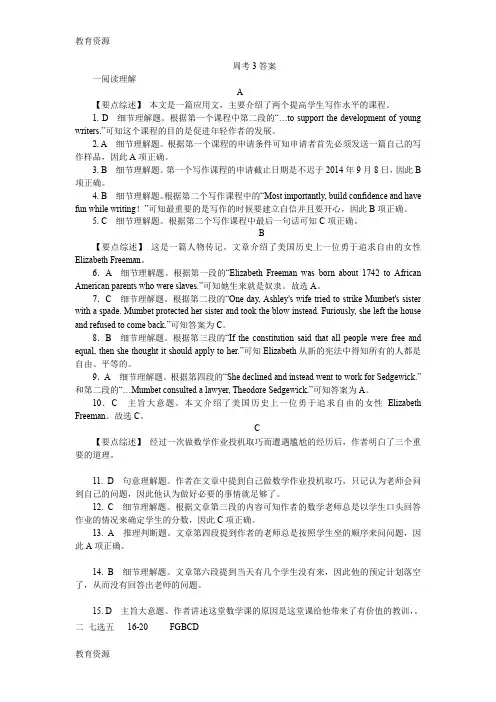
周考3答案一阅读理解A【要点综述】本文是一篇应用文,主要介绍了两个提高学生写作水平的课程。
1. D细节理解题。
根据第一个课程中第二段的“…to support the development of young writers.”可知这个课程的目的是促进年轻作者的发展。
2. A细节理解题。
根据第一个课程的申请条件可知申请者首先必须发送一篇自己的写作样品,因此A项正确。
3. B细节理解题。
第一个写作课程的申请截止日期是不迟于2014年9月8日,因此B 项正确。
4. B细节理解题。
根据第二个写作课程中的“Most importantly, build confidence and have fun while writing!”可知最重要的是写作的时候要建立自信并且要开心,因此B项正确。
5. C细节理解题。
根据第二个写作课程中最后一句话可知C项正确。
B【要点综述】这是一篇人物传记。
文章介绍了美国历史上一位勇于追求自由的女性Elizabeth Freeman。
6.A细节理解题。
根据第一段的“Elizabeth Freeman was born about 1742 to African American parents who were slaves.”可知她生来就是奴隶。
故选A。
7.C细节理解题。
根据第二段的“One day, Ashley's wife tried to strike Mumbet's sister with a spade. Mumbet protected her sister and took the blow instead. Furiously, she left the house and refused to come back.”可知答案为C。
8.B细节理解题。
根据第三段的“If the constitution said that all people were free and equal, then she thought it should apply to her.”可知Elizabeth从新的宪法中得知所有的人都是自由、平等的。
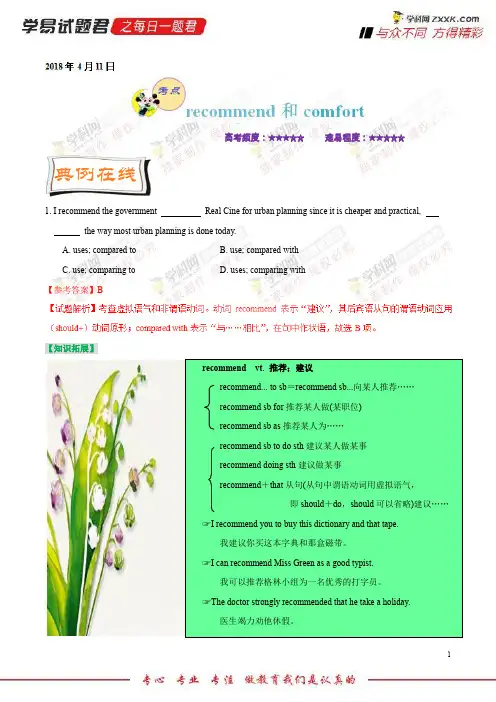
1 高考频度:★★★☆☆ 难易程度:★★☆☆☆
1. I recommend the government Real Cine for urban planning since it is cheaper and practical, the way most urban planning is done today.
A. uses; compared to
B. use; compared with
C. use; comparing to
D. uses; comparing with
【参考答案】
B
【知识拓展】
recommend vt. 推荐;建议
recommend... to sb =recommend sb...向某人推荐……
recommend sb for 推荐某人做(某职位)
recommend sb as 推荐某人为……
recommend sb to do sth 建议某人做某事
recommend doing sth 建议做某事
recommend +that 从句(从句中谓语动词用虚拟语气, 即should +do ,should 可以省略)建议…… ☞I recommend you to buy this dictionary and that tape.
我建议你买这本字典和那盒磁带。
☞I can recommend Miss Green as a good typist.
我可以推荐格林小组为一名优秀的打字员。
☞The doctor strongly recommended that he take a holiday. 医生竭力劝他休假。
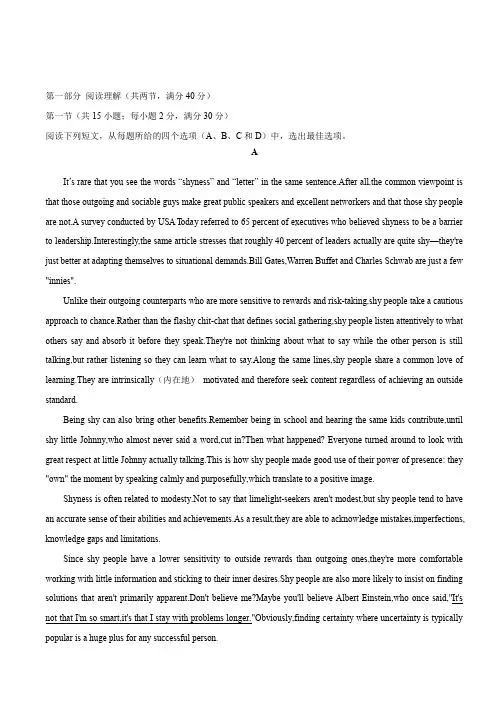
第一部分阅读理解(共两节,满分40分)第一节(共15小题;每小题2分,满分30分)阅读下列短文,从每题所给的四个选项(A、B、C和D)中,选出最佳选项。
AIt’s rare that you see the words “shyness” and “letter” in the same sentence.After all,the common viewpoint is that those outgoing and sociable guys make great public speakers and excellent networkers and that those shy people are not.A survey conducted by USA Today referred to 65 percent of executives who believed shyness to be a barrier to leadership.Interestingly,the same article stresses that roughly 40 percent of leaders actually are quite shy—they're just better at adapting themselves to situational demands.Bill Gates,Warren Buffet and Charles Schwab are just a few "innies".Unlike their outgoing counterparts who are more sensitive to rewards and risk-taking,shy people take a cautious approach to chance.Rather than the flashy chit-chat that defines social gathering,shy people listen attentively to what others say and absorb it before they speak.They're not thinking about what to say while the other person is still talking,but rather listening so they can learn what to say.Along the same lines,shy people share a common love of learning.They are intrinsically(内在地)motivated and therefore seek content regardless of achieving an outside standard.Being shy can also bring other benefits.Remember being in school and hearing the same kids contribute,until shy little Johnny,who almost never said a word,cut in?Then what happened? Everyone turned around to look with great respect at little Johnny actually talking.This is how shy people made good use of their power of presence: they "own" the moment by speaking calmly and purposefully,which translate to a positive image.Shyness is often related to modesty.Not to say that limelight-seekers aren't modest,but shy people tend to have an accurate sense of their abilities and achievements.As a result,they are able to acknowledge mistakes,imperfections, knowledge gaps and limitations.Since shy people have a lower sensitivity to outside rewards than outgoing ones,they're more comfortable working with little information and sticking to their inner desires.Shy people are also more likely to insist on finding solutions that aren't primarily apparent.Don't believe me?Maybe you'll believe Albert Einstein,who once said,"It's not that I'm so smart,it's that I stay with problems longer."Obviously,finding certainty where uncertainty is typically popular is a huge plus for any successful person.The myth that shy people are less effective leaders than their outgoing fellows is just a misunderstanding.Make wise use of your personality strengths to lead your business no matter what side of the range you fall on.1.We can learn from Paragraph 2 that_______.A.shy people are sensitive to rewardsB.shy people care more about contentC.outgoing people are more careful about chancesD.outgoing people consider what to learn while listening2.The example of Johnny shows______.A.shy people are likely to be modestB.hardworking students speak little in publicC.some students keep silent on purpose at schoolD.shy people may have an advantage in discussion3.We can learn from the underlined sentence in Paragraph 5 that______.A.shyness results in successB.shyness contributes to popularityC.outside reward leads to insistenceD.uncertainty counts more than certainty4.The author supports his ideas mainly by______.A.giving definitions and presenting research resultsB.explaining problems and providing solutionsC.quoting authorities and making evaluationsD.making contrasts and gibing examplesB“Can’t hold a candle to” is a popular expression.When there wasn’t electricity,someone would have a servant light his way by holding a candle.The expression meant that the person who cannot hold a candle to you is not fit even to be your servant.Now,it means such a person cannot compare or compete.Another expression is “hold your tongue.”It means to be still and not talk.“Hold your tongue”is not something you would tell a friend.But a parent or teacher might use the expression to quiet a noisy child.“Hold out”is an expression one hears often in sports reports and labor news.It means to refuse to play or work. Professional football and baseball players “hold out”if their team refuses to pay them what they think they are worth.The expression “hold up” has several different meanings.One is a robbery.A man with a gun may say,“This is a hold up.Give me your money.”Another meaning is to delay.A driver who was held up by heavy traffic might be late for work.Another meaning is for a story to be considered true after an investigation.A story can hold up if it is proved true.“Hold on” is another expression,which means wait or stop.As you leave for school,your brother may say,“Hold on,you forgot your book.” It is used to ask a telephone caller to wait and not hang up his telephone.Our final expression is “hold the line.”That means to keep a problem or situation from getting worse—to hold steady.For example,the president may say he will “hold the line on taxes.”He means there will be no increase in taxes.5.The expression “can’t hold a candle to” can be used when _______.A.some footballers refuse to play a gameB.someone else is wanted on the phoneC.someone is not qualified for a positionD.someone was delayed by heavy traffic6.The tune of the phrase “hold your tongue” is probably a little_______.A.amusingB.politeC.unfriendlyD.offensive7.If some teachers “hold out”,they probably______.A.change their attitudeB.refuse to workC.make a compromiseD.show their devotion8.Which of the following sentences can convey positive meanings?A.I was late as I was held up by a hold up.B.Hold on!You have to pay the bill,sir.C.You can’t even hold a candle to Michael.D.I promise to hold the line on house prices.CHow can we reduce the risk?There are four general approaches to dealing with volcanic(火山似的)dangers.We can try to keep the danger from occurring—often an impossible task.We can try to change its path or reduce its impact on existing development. We can take steps to protect future development.We can also do our best to have disaster response plans in place before they are needed.Removing the ThreatClearly,there is no way to stop an eruption.We can,however,attempt to reduce the eruption’s effects by strengthening structures,for example,building protective works such as walls to make lava(熔岩)flow away from developed areas.Such efforts can be and have been successful,but are of limited use in a large-scale(范围)eruption.Planning for the FutureProtecting future development from volcanic dangers is a simple task.Before building houses,we should judge the risk.If the risk seems too great,a safer location should be found.This type of planning is very effective,but all too often,people are drawn to the lush(葱郁的),rolling land of a quiet volcano.Disaster Preparedness(预案)When a volcano comes to life,a few weeks may not be enough to avoid a tragedy.Planning is the key to saving lives.Well before the warning signs occur,people must be educated about volcanic dangers.Escape plans must be inmunication between scientists,officials,the media,and the general public should be practiced.Emergency measures must be thought out and agreed upon.If you doubt the importance of these efforts,take another look at past volcanic tragedies,such as the eruption of Nevado del munication failures left the town of Armero unprepared for escape.When a deadly mudflow came down the slope(斜坡),21,000 people—90 percent of the town’s people—died.9.The passage is intended for_______.A.the general publicB.architectsC.adventurersD.geographers10.When building houses,people tend to______.A.judge volcanic dangers carefullyB.take volcanic dangers seriouslyC.live near a quiet volcanoD.find a safer place far away from a volcano11.The writer mentioned Nevado del Ruiz to prove______.A.the failure to keep volcanic dangers from happeningB.the importance of preparing for a volcanic eruptionC.the bravery of the people in Armero TownD.the uncertainty of volc ano’s damageDI was born and raised in Minnesota,the USA,but us an adult I have mostly lived in Europe and Africa.I teach cross-cultural management at the International Business School near Paris.For the last 15 years,I’ve studied how people in different parts of the world build trust,communicate,and make decisions especially in the workplace.While traveling in Tokyo recently with Japanese colleague,I gave a short talk to a group of 20 managers.At the end,I asked whether there were any questions or comments.No hands went up,so I went to sit down.My colleague whispered to me,“I think there actually were some comments,Erin.Do you mind if I try?”I agreed,but I guessed it a waste of breath.He asked the group again,“Any comments or questions?”Still,no one raised a hand,but this time he looked very carefully at each person in the silent audience.Gesturing to one of them,he said,“Do you have something to add?”To my amazement,she responded “Yes,thank you.” and asked me a very interesting question.My colleague repeated this several times,looking directly at the audience and asking for more questions or comments.After the session,I asked my colleague,“H ow do you know that those people had questions?”He hesitated,not sure how to explain it,and then said,“It has to do with how bright their eyes are.”He continued,“In Japan,we don’t make as much direct eye contact as you do in the West.So when you asked if there were any comments,most people were not looking directly at you.But a few people in the group were looking rig ht at you,and their eyes were bright.That indicates that they would be happy to have you call on them.”I thought to myself I would never have learned from my upbringing in Minnesota.Since then,I try to focus on understanding behavior in other cultures I encounter,and keep finding the bright eyes in the room.12.What can we conclude from the first paragraph?A.Life in Minnesota has made the author worn out.B.The author enjoys traveling around the world.C.Different cultures are kind of familiar to the author.D.The author may start his own business in the future.13.Hearing the colleague whispering,the author______.A.went back to his seat and got seatedB.knew his colleague had some questionsC.owed a big debt of gratitude to his colleagueD.thought his colleague would get nowhere14.Where does the author’s colleague probably come from?A.Japan.B.America.C.Africa.D.France15.Which is the proper title for the passage?A.Focusing on Behavior in Cultures.B.Looking at Another Culture in the Eye.C.Sharing Different Cultures in Tokyo.D.Admiring the Beauty in the Eye.第二节(共5小题;每小题2分,满分10分)根据短文内容,从短文后的选项中选出能填入空白处的最佳选项。
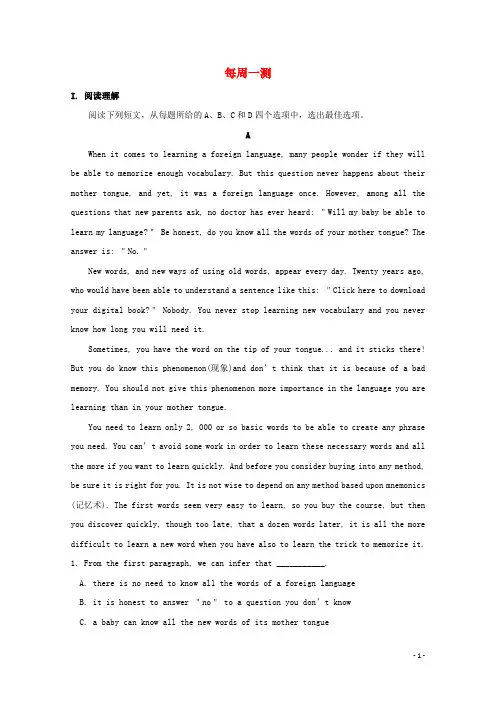
每周一测I. 阅读理解阅读下列短文,从每题所给的A、B、C和D四个选项中,选出最佳选项。
AWhen it comes to learning a foreign language, many people wonder if they will be able to memorize enough vocabulary. But this question never happens about their mother tongue, and yet, it was a foreign language once. However, among all the questions that new parents ask, no doctor has ever heard: "Will my baby be able to learn my language?" Be honest, do you know all the words of your mother tongue? The answer is: "No."New words, and new ways of using old words, appear every day. Twenty years ago, who would have been able to understand a sentence like this: "Click here to download your digital book?" Nobody. You never stop learning new vocabulary and you never know how long you will need it.Sometimes, you have the word on the tip of your tongue... and it sticks there! But you do know this phenomenon(现象)and don’t think that it is because of a bad memory. You should not give this phenomenon more importance in the language you are learning than in your mother tongue.You need to learn only 2, 000 or so basic words to be able to create any phrase you need. You can’t avoid some work in order to learn these necessary words and all the more if you want to learn quickly. And before you consider buying into any method, be sure it is right for you. It is not wise to depend on any method based upon mnemonics (记忆术). The first words seem very easy to learn, so you buy the course, but then you discover quickly, though too late, that a dozen words later, it is all the more difficult to learn a new word when you have also to learn the trick to memorize it.1. From the first paragraph, we can infer that ___________.A. there is no need to know all the words of a foreign languageB. it is honest to answer "no"to a question you don’t knowC. a baby can know all the new words of its mother tongueD. people find it hard to memorize vocabulary of their language2. To learn a foreign language, the author advises you ___________.A. to remember new words appearing every dayB. to keep up with new ways of using old wordsC. to learn at least 2,000 necessary wordsD. to pay more attention to your bad memory3. The author’s attitude to mnemonics is ___________.A. supportiveB. neutralC. opponentD. indifferent4. The passage is mainly about ____________.A. using old words in a new wayB. learning new words from the contextC. finding a method to memorize vocabularyD. learning vocabulary of a foreign languageBSpecialists say that it is not easy to get used to life in a new culture. "Culture shock" is the term these specialists use when talking about the feelings that people have in a new environment. There are three stages of culture shock, say the specialists. In the first stage, the newcomers like their new environment. Then, when the fresh experience dies, they begin to hate the city, the country, the people, and everything else. In the last stage, the newcomers begin to adjust to (适应) their surroundings and, as a result, enjoy their life more.There are some obvious factors in culture shock. The weather may be unpleasant. The customs may be different. The public service systems —the telephone, post office, or transportation — may be difficult to work out. The simplest things seem to be big problems. The language may be difficult.Who feels culture shock? Everyone does in this way or that. But culture shock surprises most people. Very often the people having the worst culture shock are those who never had any difficulties in their home countries and were successful in their community. Coming to a new country, these people find they do not have the sameestablished positions. They find themselves without a role, almost without an identity. They have to build a new self-image.Culture shock gives rise to a feeling of disorientation. This feeling may be homesickness. When homesick(想家), people feel like staying inside all the time. They want to protect themselves from the strange environment, and create an escape inside their room for a sense of security. This escape does solve the problem of culture shock for the short term, but it does nothing to make the person familiar with the culture. Getting to know the new environment and gaining experience — these are the long-term solutions to the problem of culture shock.5. According to the passage, factors that give rise to culture shock include all of the following except __________.A. language communicationB. weather conditions and customsC. public service systemsD. homesickness6. According to the passage, the more successful you are at home, ___________.A, the fewer difficulties you may have abroadB. the more difficulties you may have abroadC. the more money you will earn abroadD. the less homesick you will feel abroad7. The underlined word in the last paragraph mostly probably means ___________.A. being homesickB. being lostC. protecting oneselfD. gaining experience8. What is the main idea of the last paragraph?A. Escape unfamiliar environmentB. The feeling of homesickness.C. Homesickness can solve the problem of culture shock.D. The best way to overcome culture shock: get familiar with the new culture. II. 七选五根据短文内容,从短文后的选项中选出能填入空白处的最佳选项。
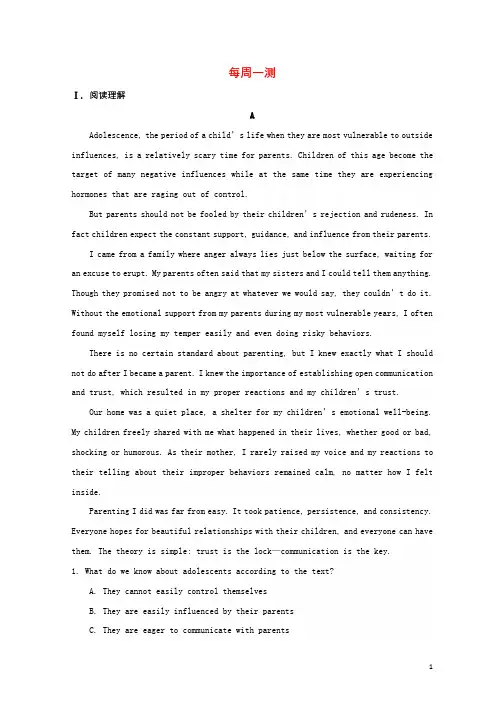
每周一测Ⅰ. 阅读理解AAdolescence, t he p eriod o f a c hild’s l ife w hen t hey a re m ost v ulnerable t o o utside influences, is a relatively scary time for parents. Children of this age become the target of many negative influences while at the same time they are experiencing hormones that are raging out of control.But parents should not be fooled by their children’s rejection and rudeness. In fact c hildren e xpect t he c onstant s upport, g uidance, a nd i nfluence f rom t heir p arents.I came from a family where anger always lies just below the surface, waiting for an e xcuse t o e rupt. M y p arents o ften s aid t hat m y s isters a nd I c ould t ell t hem a nything. Though they promised not to be angry at whatever we would say, they couldn’t do it. Without t he e motional s upport f rom m y p arents d uring m y m ost v ulnerable y ears, I o ften found myself losing my temper easily and even doing risky behaviors.There is no certain standard about parenting, but I knew exactly what I should not d o a fter I b ecame a p arent. I k new t he i mportance o f e stablishing o pen c ommunication and trust, which resulted in my proper reactions and my children’s trust.Our home was a quiet place, a shelter for my children’s emotional well-being. My children freely shared with me what happened in their lives, whether good or bad, shocking or humorous. As their mother, I rarely raised my voice and my reactions to their telling about their improper behaviors remained calm, no matter how I felt inside.Parenting I d id w as f ar f rom e asy. I t t ook p atience, p ersistence, a nd c onsistency. Everyone hopes for beautiful relationships w ith their children, and everyone can have them. The theory is simple: trust is the lock—communication is the key.1. What do we know about adolescents according to the text?A. They cannot easily control themselvesB. They are easily influenced by their parentsC. They are eager to communicate with parentsD. They don’t expect parents’ guidance and support2. Which of the following words best describes the author when she was a teenager?A. GentleB. DishonestC. HurtD. Careless3. How did the author gain trust when communicating with her children?A. By making a promiseB. By raising her voiceC. By demanding much of themD. By controlling her reactions4. The text is mainly intended to tell us __________.A. the need of riding anger at homeB. the ways of parenting adolescentsC. the importance of supporting childrenD. the benefit of building good relationships with childrenBA new report said that different types of plants can release some chemical intothe air to help other plants. These chemical warnings all have the same purpose —to spread information about one plant's disease or infestation so other plants can defend themselves. But exactly how plants receive and act on many of these signalsis still mysterious.In this week’s Proceedings of the National Academy of Sciences, researchers in Japan offered some explanations. They had identified one chemical message and traced it all the way from release to action.The scientists looked at tomato plants infested by a common pest, the cutworm. The researchers studied leaves from exposed and unexposed plants. They found one compound showed up more often in the exposed plants. The substance is called Hex Vic. When the scientists fed Hex Vic to cutworms, it knocked down their survival rate by 17%. The scientists identified the source of Hex Vic, and sprayed it lightly overhealthy plants. Those plants were then able to start producing the cutworm-killing Hex Vic. Researchers confirmed that uninfected plants have to build their own weapons to fight off bugs and disease. How do they know when to play defense? They are warned first by their friendly plant neighbors.It is a complex tale, and it may be happening in more plant species than tomatoes.It may also be happening with more chemical signals that are still unknown to us. Further studies are needed to increase agricultural efficiency.5. Which is the way used by plants to warn their neighbors?A. Using of winds.B. Identifying the chemicals.C. Releasing some chemicals.D. Being exposed early.6. It can be inferred from the text that ________.A. farmers may benefit from the further studiesB. the phenomenon may be happening in less plant species than tomatoesC. there are not chemical signalsD. plants are warned first by their neighbors7. What’s the function of Hex Vic?A. It sprays over healthy plants.B. It shows up more.C. It cures the disease.D. It damages the cutworm’s body.8. The passage is likely to appear in ________.A. a newspaper advertisementB. a physics textbookC. a science magazineD. a finance reportⅡ. 完形填空When I was younger, I was addicted to the stories in magic books, and I thirstily 1them. And like most of the 2of these stories I secretly wished for magical power for myself. I wanted to be able to 3make my pain disappear, to make my 4go away, and to have power over this world that so often has 5over us.6I got older, however, I realized that there was no such thing as magic andthe 7reality of life set in. I struggled through a long period of 8. I haddaily pain from a back injury that never healed right. I felt sadness and 9whenboth of my sons w ere diagnosed 10Autism. I still sometimes daydreamed about magic but in time even that 11.Then one day I began to 12that a different kind of magic called LOVE grew stronger in my heart, soul and 13day by day. This magic connected me to my own best s elf a nd t o a ll o f 14souls i n t his w orld. I t d idn’t m ake m e 15my p overtybut it made every day of my life 16. It didn’t make my back pain go away but it helped me 17it so much better. It didn’t cure my 18Autism but it helped mesee their beautiful, 19, eternal, and joyful souls.There i s s uch a t hing a s m agic i n e ach o ne o f u s i n t his w orld. T his m agic i s c alled LOVE. May you choose it, share it, and 20in it every single day of your life.1. A.obtained B.found C.read D.acquired2. A.parents B.readers C.authorsD.children3. A.magically B.carefully C.doubtfully D.actually4. A.changes B.problems C.efforts D.attempts5. A.chance B.interest C.power D.responsibility6. A.As B.While C.Since D.If7. A.peaceful B.imaginable C.unrealizedpetitive8. A.poverty B.happiness C.safety D.hesitation9. A.sorrow B.joy C.determination D.impatience10. A.by B.with C.to D.on11. A.got away B.put away C.gave away D.faded away12. A.predict B.discover C.observe D.suspect13. A.mind B.blood C.spirit D.belief14. A.the others B.the rest C.the other D.any other15. A.take charge of B.get rid of C.make use of D.have command of16. A.busier B.poorer C.happier D.luckier17. y out B.make up C.take off D.deal with18. A.parents’ B.sons’ C.daughters’ D.students’19. A.painful eful C.lovingD.wonderful20. A.take B.exist C.live D.giveⅢ. 语法填空阅读下面短文,在空白处填入1个适当的单词或括号内单词的正确形式。

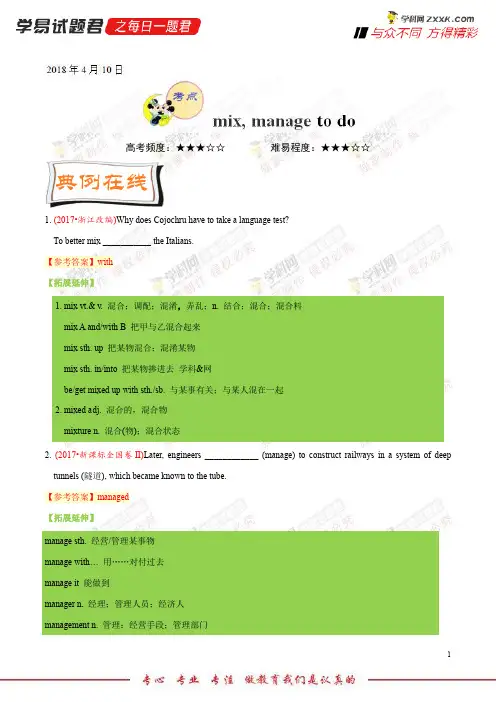
高考频度:★★★☆☆难易程度:★★★☆☆1. (2017•浙江改编)Why does Cojochru have to take a language test? To better mix ___________ the Italians.【参考答案】with 【拓展延伸】1. mix vt.& v. 混合;调配;混淆,弄乱;n. 结合;混合;混合料 mix A and/with B 把甲与乙混合起来 mix sth. up 把某物混合;混淆某物 mix sth. in/into 把某物掺进去 学科&网 be/get mixed up with sth./sb. 与某事有关;与某人混在一起2. mixed adj. 混合的,混合物 mixture n. 混合(物);混合状态2. (2017•新课标全国卷 II)Later, engineers ____________ (manage) to construct railways in a system of deep tunnels (隧道), which became known to the tube.【参考答案】managed 【拓展延伸】 manage sth. 经营/管理某事物 manage with… 用……对付过去 manage it 能做到 manager n. 经理;管理人员;经济人 management n. 管理;经营手段;管理部门1【易混辨析】manage to do /try to do/try doingmanage to do sth. 表示"设法成功地做了某事",强调结果,相当于 succeed in doing sth.。
try to do sth. 表示"设法/努力去做某事",强调目的,不定式的动作或状态不一定能实现。
try doing表示"试着做某事"。
学科&网☛He worked hard and managed to pass the exam.他努力学习并顺利通过了考试。
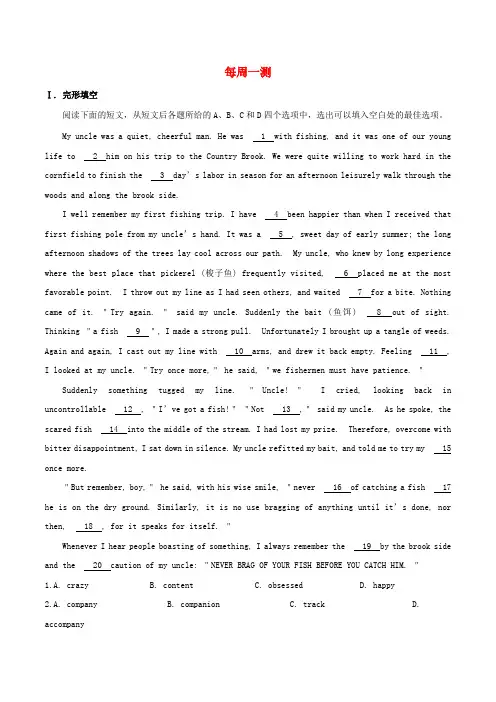
每周一测Ⅰ.完形填空阅读下面的短文,从短文后各题所给的A、B、C和D四个选项中,选出可以填入空白处的最佳选项。
My uncle was a quiet, cheerful man. He was 1 with fishing, and it was one of our young life to 2 him on his trip to the Country Brook. We were quite willing to work hard in the cornfield to finish the 3 day’s labor in season for an afternoon leisurely walk through the woods and along the brook side.I well remember my first fishing trip. I have 4 been happier than when I received that first fishing pole from my uncle’s hand. It was a 5 , sweet day of early summer; the long afternoon shadows of the trees lay cool across our path. My uncle, who knew by long experience where the best place that pickerel (梭子鱼) frequently visited, 6 placed me at the most favorable point. I throw out my line as I had seen others, and waited 7 for a bite. Nothing came of it. "Try again. "said my uncle. Suddenly the bait (鱼饵) 8 out of sight. Thinking "a fish 9 ", I made a strong pull. Unfortunately I brought up a tangle of weeds. Again and again, I cast out my line with 10 arms, and drew it back empty. Feeling 11 , I looked at my uncle. "Try once more," he said, "we fishermen must have patience. "Suddenly something tugged my line. "Uncle!"I cried, looking back in uncontrollable 12 , "I’ve got a fish!""Not 13 ," said my uncle. As he spoke, the scared fish 14 into the middle of the stream. I had lost my prize. Therefore, overcome with bitter disappointment, I sat down in silence. My uncle refitted my bait, and told me to try my 15 once more."But remember, boy," he said, with his wise smile, "never 16 of catching a fish 17 he is on the dry ground. Similarly, it is no use bragging of anything until it’s done, nor then, 18 , for it speaks for itself. "Whenever I hear people boasting of something, I always remember the 19 by the brook side and the 20 caution of my uncle: "NEVER BRAG OF YOUR FISH BEFORE YOU CATCH HIM. "1.A. crazy B. content C. obsessed D. happy2.A. company B. companion C. track D. accompany3.A. necessary B. extra C. ordinary D. extraordinary4.A. even B. ever C. never D. always5.A. hot B. heated C. noisy D. still6.A. considerably B. patiently C. closely D. considerately7.A. carefully B. leisurely C. patiently D. anxiously8.A. rose B. came C. sank D. lost9.A. above all B. at last C. after all D. at least10.A. tiring B. rising C. aching D. falling11.A. worried B. concerned C. discouraged D. puzzled12.A. excitement B. disappointment C. surprise D. satisfaction13.A. still B. even C. yet D. ever14.A. shot B. jumped C. went D. swam15.A. hand B. pole C. luck D. chance16.A. brag B. pride C. proud D. show17.A. unless B. until C. while D. when18.A. too B. also C. either D. as we19.A. scenery B. view C. scene D. sight20.A. curious B. generous C. willing D. wiseII.阅读理解根据短文内容,从短文后的选项中选出能填入空白处的最佳选项。
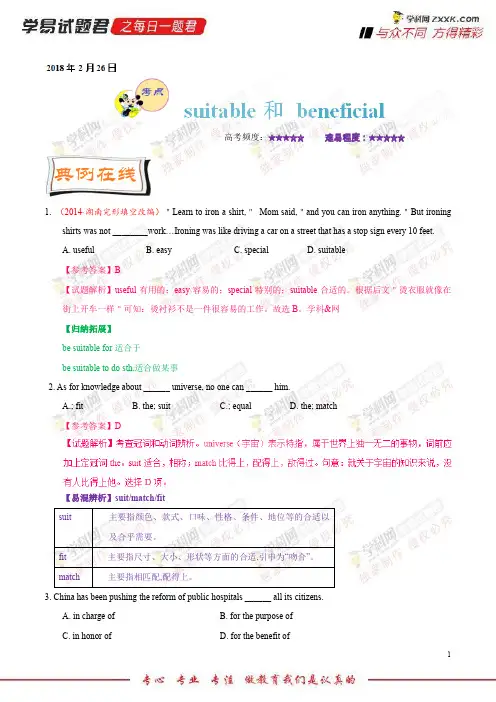
1 高考频度:★★★☆☆ 难易程度:★★☆☆☆1. (2014·湖南完形填空改编)"Learn to iron a shirt," Mom said,"and you can iron anything."But ironing shirts was not ________work…Ironing was like driving a car on a street that has a stop sign every 10 feet.A. usefulB. easyC. specialD. suitable【参考答案】B【试题解析】useful 有用的;easy 容易的;special 特别的;suitable 合适的。
根据后文"烫衣服就像在街上开车一样"可知:烫衬衫不是一件很容易的工作。
故选B 。
学科&网【归纳拓展】be suitable for 适合于 be suitable to do sth.适合做某事2. As for knowledge about ______ universe, no one can ______ him.A.; fitB. the; suitC.; equalD. the; match 【参考答案】D【易混辨析】suit/match/fit suit主要指颜色、款式、口味、性格、条件、地位等的合适以及合乎需要。
fit主要指尺寸、大小、形状等方面的合适,引申为“吻合”。
match 主要指相匹配,配得上。
3. China has been pushing the reform of public hospitals ______ all its citizens.A. in charge ofB. for the purpose ofC. in honor ofD. for the benefit of。
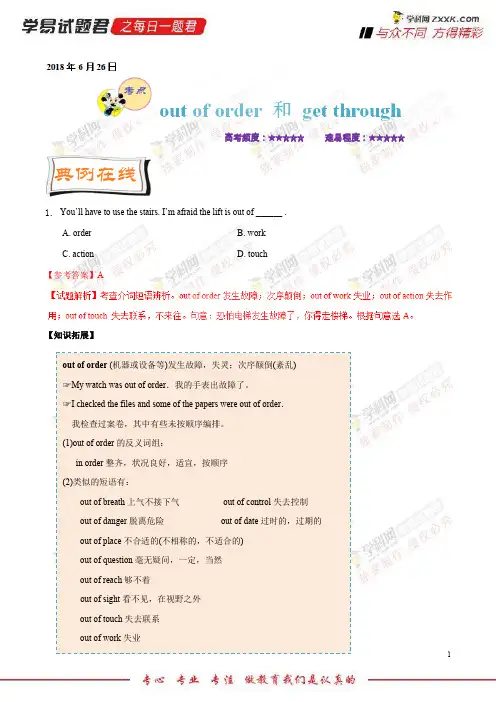
1 out of order (机器或设备等)发生故障,失灵;次序颠倒(紊乱) ☞My watch was out of order .我的手表出故障了。
☞I checked the files and some of the papers were out of order . 我检查过案卷,其中有些未按顺序编排。
(1)out of order 的反义词组: in order 整齐,状况良好,适宜,按顺序 (2)类似的短语有: out of breath 上气不接下气 out of control 失去控制 out of danger 脱离危险 out of date 过时的,过期的
out of place 不合适的(不相称的,不适合的)
out of question 毫无疑问,一定,当然 out of reach 够不着 out of sight 看不见,在视野之外
out of touch 失去联系
out of work 失业
高考频度:★★☆☆☆ 难易程度:★★☆☆☆
1. You’ll have to use the stairs. I’m afraid the lift is out of ______ .
A. order
B. work
C. action
D. touch 【参考答案】A
【知识拓展】。
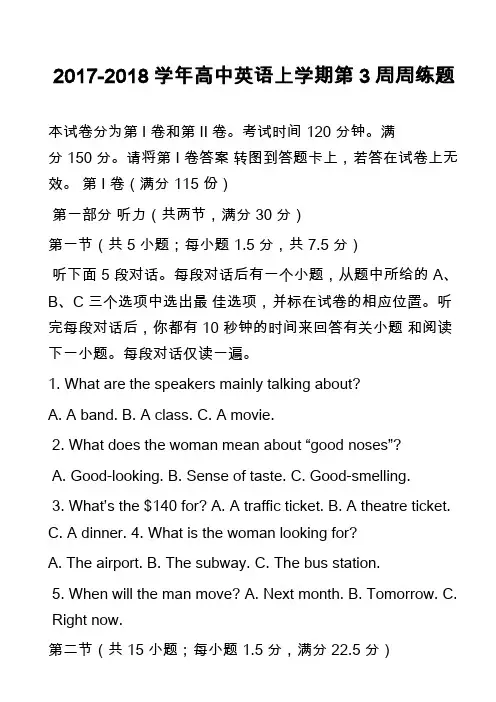
2017-2018学年高中英语上学期第3周周练题本试卷分为第 I 卷和第 II 卷。
考试时间 120 分钟。
满分 150 分。
请将第 I 卷答案转图到答题卡上,若答在试卷上无效。
第 I 卷(满分 115 份)第一部分听力(共两节,满分 30 分)第一节(共 5 小题;每小题 1.5 分,共 7.5 分)听下面 5 段对话。
每段对话后有一个小题,从题中所给的 A、B、C 三个选项中选出最佳选项,并标在试卷的相应位置。
听完每段对话后,你都有 10 秒钟的时间来回答有关小题和阅读下一小题。
每段对话仅读一遍。
1. What are the speakers mainly talking about?A. A band.B. A class.C. A movie.2. What does the woman mean about “good noses”?A. Good-looking.B. Sense of taste.C. Good-smelling.3. What’s the $140 for? A. A traffic ticket. B. A theatre ticket.C. A dinner. 4. What is the woman looking for?A. The airport.B. The subway.C. The bus station.5. When will the man move? A. Next month. B. Tomorrow. C. Right now.第二节(共 15 小题;每小题 1.5 分,满分 22.5 分)听下面 5 段对话或独白。
每段对话或独白后有几个小题,从题中所给的 A、B、C 三个选项中选出最佳选项,并标在试卷的相应位置。
听每段对话或独白前,你将有时间阅读各个小题,每小题 5 秒钟;听完后,各小题将给出 5 秒钟的作答时间。
每段对话或独白读两遍。
每周一测Ⅰ. 阅读理解AThough they have been around since the late 1990’s, emoji(表情符号) usage has increased sharply with the wide use of smartphones.Recently, a team from the University of Michigan and Peking University analyzed 427 million messages sent by users in 212 countries to look into the differences in emoji use by location and culture. The findings indicated the French are emoji power users and included them in 19.7% of their texts. It’s almost twice that of Russia, where only 10.9% of the messages contained emojis. Americans came in a close third at 9.2% and was followed by Mexico at 7.9%.Also, though the handily wins the title as the most popular emoji, the French appear toprefer the . They are also more likely to use variations of the heart emoji.Not surprisingly, the study found that women tend to use emojis more extensively than men. However, they stick to a handful of favorites. Men, on the other hand, show better judgment and appear to go to extra length to find an emoji that matches the situation. But even so, they select from the top 119 of the 1 281 emojis available.The researchers say people living in Australia and France who believe one person’s need is greater than that of a society or group, used happier emojis. Conversely, those from countries with closely knit societies, like Colombia, prefer using sad or angry emojis.Also, cultures like Turkey and Russia, known for their strictness, appeared to be more content, at least according to the emojis. On the other hand, people in tolerant cultures, like Mexico, seemed unhappy or dissatisfied.The researchers believe the findings of this "first large-scale analysis of emoji usage" will help develop input methods and perhaps even expand our emoji vocabulary! Who knew the tiny image we add to brighten up our texts could show so much about our culture?1. Which country is the second-place winner of the use of emojis?A. France.B. America.C. Russia.D. Mexico.2. How are men different from women in using emojis?A. Men often choose the rarely used emojis.B. Men use more variations of the heart emoji.C. Men use emojis more casually than women.D. Men can better match the emojis with the situation.3. Which can best replace the underlined word "Conversely" in Paragraph 5?A. In general.B. In other words.C. On the contrary.D. As a result.4. What did researchers conclude from the study?A. Emojis can show people’s true feelings.B. The emoji selection is influenced by our culture.C. Emojis could strengthen bonds between people.D. The invention of smartphones brought emojis into being.BCan exercise during childhood protect you against memory loss many decades later? Exercise early in life seems to have lifelong benefits for the brain, in rats at least.“This is an animal study,but it shows that physical activity at a young age is very important—not just for physical development, but for the whole lifelong track of cognitive(认知的)development during ageing,”says Martin Wojtowicz of the University of Toronto,Canada.“In humans, it may delay the appearance of Alzheimer's symptoms(阿茨海默氏症),possibly to the point of preventing them.”Wojtowicz’s team div ided 80 young male rats into two equal groups, and placed running wheels in the cages of one group for a period of six weeks. Around four months later—when the rats had reached middle age—the team taught all the rats to connect an electric shock with being in a specific. When placed in the box, they froze with fear.Two weeks later, the team tested the rats in three situations: exactly the same box in the same room, the same box with the room arranged differently, and a completely different box in a different room.The rats without access to a running wheel when they were young now froze the same percentage of times in each of these situations, suggesting they couldn't remember which one was dangerous.But those that had been able to run in their youth froze 40 to 50 percent less in both changed box settings."The results suggest the amount of physical activity when we're young, at least for rats, has influence on brain and cognitive health—in the form of better memories—when we're older," says Arthur Kramer of Northeastern University in Boston, who has found that, in humans, exercise promotes the growth of new brain cells.5. The study shows that_____.A. physical activity is important for physical healthB. using the running wheels is of benefit to the rats’ growthC. physical activity can prevent human’s Alzheimer's symptomsD. the more exercise a rat has when young,the better memory it will possess when older6. How are Paragraph 3 and 4 mainly developed?A. By analyzing causes.B. By giving an example.C. By describing the process.D. By showing differences.7. What does the underlined word "it" in Paragraph 2 refer to?A. Exercise.B. Development.C. Benefit.D. Study.8. What is the author's attitude towards the animal study?A. Negative.B. Objective.C. Critical.D. Doubtful.Ⅱ. 完形填空It was an extraordinary night. The noisy Mexico City gradually 1 . The main stadium of the Olympic track and field competition was covered in the 2 .After he finished making the scenes of the marathon winners 3 the prizes, Greenspan, the world famous news documentary producer, found the 4 empty. It was time for him to 5 to the hotel for a rest. He was about to leave 6 he suddenly saw a bandaged man 7 the stadium. This man ran completely 8 , but he didn’t stop. After he ran along the runway for a circleand got to the goal, he collapsed on the ground.Greenspan guessed this was a marathon athlete. Out of curiosity, he 9 to ask why the athlete wanted to run to the 10 with such a difficulty. The young man replied, "That my country sent me here 11 more than 20 000 kilometers is not to let me only get off the starting line in the competition, but to make me 12 the game. I want to run to the goal, though I have 13 all other runners, but I have a(n) 14 goal like them: I will run to the goal. 15 the audience won’t cheer me any more, my motherland is watching me16 from behind." Tears poured from Greenspan’s eyes. Soon, he spread the most17 scene in the history of the Olympic Games to every corner of the world.Life should have a dream of 18 the peak, yet we should understand not everybody has the ability to do it. The most 19 is not whether we can get to the peak but whether we have made the greatest 20 — to reach the goal in the mind is a success.1. A.withdrew B.extended C.calmed down y down2. A.coldness B.kindness C.witness D.darkness3. A.donating B.refusing C.receiving D.offering4. A.classroom B.stadium C.hall D.square5. A.return B.move C.turn D.lead6. A.before B.when C.since D.until7. A.ran into B.ran out C.left D.approached8. A.aimlessly B.carelessly C.out of work D.out of breath9. A.drew back B.walked out C.went over D.moved on10. A.goal B.consequence C.ambition D.condition11. A.with B.by C.of D.from12. A.accompany plete C.participate D.conquer13. A.fallen apart B.fallen down C.fallen away D.fallen behind14. A.innocent B.important C.sacred D.awful15. A.Though B.That C.As long as D.As soon as16. A.wildly B.curiously C.devotedly D.excitedly17. A.thrilling B.touching C.unforgettable D.unimaginable18. A.climbing B.reaching C.seizing D.exploring19. A.impressive B.remarkable C.obvious D.important20. A.efforts B.spirits C.gains D.measuresⅢ. 语法填空阅读下面短文,在空白处填入 1个适当的单词或括号内单词的正确形式。
1 高考频度:★★★★☆ 难易程度:★★★☆☆1. (2015·重庆改编)He observed that Homer was still ___________ (钦佩)after two thousand years.【参考答案】admired【拓展延伸】1. admire vt.赞美;钦佩;羡慕admire sb./sth.羡慕某人/某物;喜欢某人/某物admire sb. for sth.因某事而钦佩某人admire to do sth.喜欢做某事admire that...钦佩……2. admiration n. 钦佩,赞赏;引人赞美的人或物in admiration of对……表示钦佩have/express admiration for sb.(表示)钦佩某人with/in admiration (for) (因为……)钦佩3. admirable adj. 令人钦佩的;值得赞美的;绝妙的;极好的【巧学妙记】一言巧记admire :The admirers admire the famous actor for his excellent performance, which they enjoy with/ in admiration , and because of having admiration for him, some of them even email him frequently.这些羡慕者因这位著名演员的出色表演而钦佩他。
他们带着钦佩之情欣赏他的表演。
一些人因为钦佩他甚至经常给他发邮件。
学科*网2. (2017·浙江改编)She had asked the government for to move the books to a safe place, but they refused. So Alia took matters into her own hands.A. permissionB. confirmationC. explanationD. information。
每周一测Ⅰ. 阅读理解AIs going on holiday of any benefit? New research shows that going on holiday makes you not only feel good while you’re there but also gain the health benefits for months.Jetting off to destinations such as the Maldives cuts your blood pressure, helps you sleep better and bounce back from stress. The benefits last at least a fortnight longer than the vacation and can be felt for months in some cases where it is claimed. Experts say workers should always take their holiday entitlement (权利) each year, but as many as one in three don’t.The study compared key health markers in holidaymakers visiting Thailand, Peru or the Maldives, with those in people who stayed at home and continued working. The average blood pressure of those on holiday dropped by six percent while the workers saw their blood pressure rise by two percent over the same period. The sleep quality of holidaymakers improved by 17 percent while that of the non—holidaymakers deteriorated by 14 percent.The study also found the ability of vacationers to recover from stress, known as the stress-resilience test, improved by 29 percent. There was a 71 percent fall in stress-resilience scores among workers. Tests showed fallen blood glucose (葡萄糖) levels, reduced risk of diabetes (糖尿病), trimmer waistlines and improved mood and energy levels, with the effects sustained for at least two weeks after returning home.The Holiday Health Experiment was conducted by tour operator Kuoni and Nuffield Health, the UK’s largest healthcare charity.1. According to the passage, how many people go on holiday?A. One third.B. Two thirds.C. 17 percent.D. A quarter.2. Which of the following can we infer from the passage?A. The further you go, the better you get the benefits.B. Most people like to stay at home during the holiday.C. The result of the study is mostly based on the description from the people involved.D. Holidaymakers are more likely to be healthier than non-holidaymakers.3. The author intends to tell us that .A. we have to go on holiday as much as possibleB. you’ll certainly get depressed if you don’t go on holidayC. we had better go on holiday for the benefits of our healthD. it is best to go to foreign countries like Maldives4. The best title of the passage is .A. A Holiday Health ExperimentB. Health Benefits from HolidayC. Health Problems of Having HolidayD. Key Health Markers m HolidaymakersBDogs are wonderful companions all their own, but they can also help change your life so that you’re more accepting of new friendships.A new study studied how dogs’ brains responded to the human voice and found that “the human brain responds to dog emotions the same way it responds to human emotions” and that the dog’s brain does the same.Dogs are pack animals, so in terms of pet ownership, your dog will prefer to stay with you rather than somewhere alone. Think about how this concept applies to friendship. People today are getting more and more used to spending time on social networking, email, and text. While all methods of communication are good, there is nothing like seeing your friends and hearing their voice. With good friends, sometimes a look explains everything, and you can only get this when you’re together hanging out in person.。
2021年10月28日I.单项填空1. It sounds like something is wrong with the car’s engine. ____________, we’d better take itto the garage immediately.A. OtherwiseB. If notC. But for thatD. If so2. —I paid little attention to the quality of products all the time in the past.—Well, you _____________.A. shouldB. couldC. would haveD. ought to have4. It is the talent and hard work of the musical group ____________ allow them to win over many fans.A. whoB. thatC. whichD. where5. It is not until we have developed the better qualities in ourselves ____________ we can expectto find them in others.A. whenB. whereC. thatD. whether6. —Where did the professor made the speech yesterday?—It was in the hall ____________ the students often have a meeting ____________ the professor made the speech yesterday.A. that;whichB. where;thatC. that;whenD. where;when7. No sooner _______________ to the station _______________ the train left.A. had I got;whenB. I had got;thanC. had I got;thanD. did I get;when8. It was not until dark _______________ he thought was the correct way to solve the problem.A. did he find whatB. when he found thatC. that he found whatD. when he found whatII. 阅读理解阅读下面短文,从每题所给的A、B、C、D四个选项中,选出最正确答案。
每周一测I. 阅读理解阅读下列短文,从每题所给的A、B、C和D四个选项中,选出最佳选项。
AWhen it comes to learning a foreign language, many people wonder if they will be able to memorize enough vocabulary. But this question never happens about their mother tongue, and yet, it was a foreign language once. However, among all the questions that new parents ask, no doctor has ever heard: "Will my baby be able to learn my language?" Be honest, do you know all the words of your mother tongue? The answer is: "No."New words, and new ways of using old words, appear every day. Twenty years ago, who would have been able to understand a sentence like this: "Click here to download your digital book?" Nobody. You never stop learning new vocabulary and you never know how long you will need it.Sometimes, you have the word on the tip of your tongue... and it sticks there! But you do know this phenomenon(现象)and don’t think that it is because of a bad memory. You should not give this phenomenon more importance in the language you are learning than in your mother tongue.You need to learn only 2, 000 or so basic words to be able to create any phrase you need. You can’t avoid some work in order to learn these necessary words and all the more if you want to learn quickly. And before you consider buying into any method, be sure it is right for you. It is not wise to depend on any method based upon mnemonics (记忆术). The first words seem very easy to learn, so you buy the course, but then you discover quickly, though too late, that a dozen words later, it is all the more difficult to learn a new word when you have also to learn the trick to memorize it.1. From the first paragraph, we can infer that ___________.A. there is no need to know all the words of a foreign languageB. it is honest to answer "no"to a question you don’t knowC. a baby can know all the new words of its mother tongueD. people find it hard to memorize vocabulary of their language2. To learn a foreign language, the author advises you ___________.A. to remember new words appearing every dayB. to keep up with new ways of using old wordsC. to learn at least 2,000 necessary wordsD. to pay more attention to your bad memory3. The author’s attitude to mnemonics is ___________.A. supportiveB. neutralC. opponentD. indifferent4. The passage is mainly about ____________.A. using old words in a new wayB. learning new words from the contextC. finding a method to memorize vocabularyD. learning vocabulary of a foreign languageBSpecialists say that it is not easy to get used to life in a new culture. "Culture shock" is the term these specialists use when talking about the feelings that people have in a new environment. There are three stages of culture shock, say the specialists. In the first stage, the newcomers like their new environment. Then, when the fresh experience dies, they begin to hate the city, the country, the people, and everything else. In the last stage, the newcomers begin to adjust to (适应) their surroundings and, as a result, enjoy their life more.There are some obvious factors in culture shock. The weather may be unpleasant. The customs may be different. The public service systems —the telephone, post office, or transportation — may be difficult to work out. The simplest things seem to be big problems. The language may be difficult.Who feels culture shock? Everyone does in this way or that. But culture shock surprises most people. Very often the people having the worst culture shock are those who never had any difficulties in their home countries and were successful in their community. Coming to a new country, these people find they do not have the sameestablished positions. They find themselves without a role, almost without an identity. They have to build a new self-image.Culture shock gives rise to a feeling of disorientation. This feeling may be homesickness. When homesick(想家), people feel like staying inside all the time. They want to protect themselves from the strange environment, and create an escape inside their room for a sense of security. This escape does solve the problem of culture shock for the short term, but it does nothing to make the person familiar with the culture. Getting to know the new environment and gaining experience — these are the long-term solutions to the problem of culture shock.5. According to the passage, factors that give rise to culture shock include all of the following except __________.A. language communicationB. weather conditions and customsC. public service systemsD. homesickness6. According to the passage, the more successful you are at home, ___________.A, the fewer difficulties you may have abroadB. the more difficulties you may have abroadC. the more money you will earn abroadD. the less homesick you will feel abroad7. The underlined word in the last paragraph mostly probably means ___________.A. being homesickB. being lostC. protecting oneselfD. gaining experience8. What is the main idea of the last paragraph?A. Escape unfamiliar environmentB. The feeling of homesickness.C. Homesickness can solve the problem of culture shock.D. The best way to overcome culture shock: get familiar with the new culture. II. 七选五根据短文内容,从短文后的选项中选出能填入空白处的最佳选项。